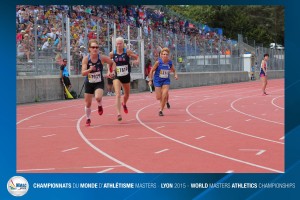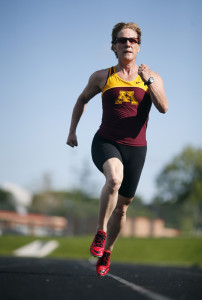Born to Sprint: Susan Adams Loyd, Media Executive, Finds Her Stride
By Stephen Dupont, vice president, Pocket Hercules
I met Susan Adams Loyd in early December 2015 at the Art Directors Club of New York, which was hosting its annual out-of-home media conference. Our team at Pocket Hercules, along with our media strategy partner, Cottage 8, and Clear Channel, were honored to receive the Out-of-Home Media Plan of the Year for our “You Make Me Smile” Campaign for Delta Dental of Minnesota.
Between sessions, I learned that Susan had a transforming moment in her life that I thought was incredibly inspirational and worth sharing on my blog. I followed up with her after the event and here’s our interview.
The lesson: You’re never too old to grab hold of your dreams. In fact, following those dreams can open you up to new possibilities that you never imagined.
Stephen: Hi Susan, can you explain what you do at Clear Channel?
Susan: I am president and branch manager of Clear Channel’s Minneapolis-St. Paul Division.
Stephen: What intrigued me about you was your story about how you started to run back in your mid-40s. We’re not talking about running 5K fun runs. You’re running at the elite level, in sprints. Can you share your story?
Susan: Sure. About 12 years ago, when I was about 45 years old, I was at the retirement party for a friend and co-worker. I was general manager at WAWS and WTEV in Jacksonville, Florida, at the time. I had two teenagers, and was married. We were talking about our careers, and life in general, when my friend Jerry asked me, “Do you have any regrets?”
That’s when I just blurted out: “I’ve always wanted to be a sprinter.”
And Jerry replied, “Well, why don’t you go do it.” I’ll always remember his tone. It was like, “I’m annoyed that you haven’t done this yet.”
Stephen: And why did you say that? Some people might say, “I’ve always wanted to run a marathon, but you said, ‘I want to be a sprinter.’”
Susan: Well, I’m 57 years old. When I was growing up, girls were not encouraged to be in sports. My own mother didn’t think it was very lady-like. But I knew I could run. I knew I could run fast. And if there were track and field for girls at that time, I would have wanted to participate. But, there wasn’t. This was before Title IX.
Stephen: So why then – at 45 years old?
Susan: I think I could feel myself aging. And I was sad that I hadn’t fulfilled that part of me. But Jerry made it very clear, in his way. The barrier to running for women didn’t exist anymore. I had become the barrier.
Stephen: So what did you do next?
Susan: I went to the local high school track and starting running. Eventually I found this entire track and field community, and ultimately, I qualified and participated in the National Senior Games. Imagine that: executive, mom and world-ranked sprinter at the age of 57!
Stephen: What are your events?
Susan: My primary focus at first was the 100-meter dash, and I ran in my first high-level competition at the Senior Games in Palo Alto when I was 51. But since that time, I’ve shifted my focus and training to the 200m and 400m which, actually, fit better with my genetic strengths.
Stephen: Your success at running has taken you all over the world…
Susan: Yes. I’ve participated in four world championships, and have been to five countries. Another thing, I’ve also run in more 100 NCAA meets and other competitions with college athletes as an unattached runner.
Stephen: What’s it like to be running head-to-head with college students who have been recruited to run for schools like the University of Minnesota?
Susan: It can be intimidating, but I just love it! I love being around young people. I train with young women and men all the time. Coaches often tell me that the student athletes benefit from it too. We learn from one another. I also think it’s good for your mindset. I’ve read several stories about this: People who live fuller, richer lives have a mindset of ‘bring it on’ versus those who think and act old.
Working out with younger people has taught me that you need to be open to new things.
Stephen: What did it feel like? To do something new and in line with a deeply held passion?
Susan: Like a bolt of lightning! I felt stupid a times, believe me. But I kept pursuing it. I thought, “Well, if I’m going to be this audacious, what else am I missing in this experience?”
Stephen: Did it spur you to try other new things?
Susan: Yes. Now I’m in the middle of an online/hybrid management program through Harvard University Extension program. I’m taking business classes with people, many of whom are 10, 20 or 30 years younger than me from all over the world.
Stephen: Why did you decide to get a second master’s degree?
Susan: I love learning, and what I’ve learned from all of this is that maybe the journey is inward. It doesn’t necessarily have to be Harvard. It could be Dunwoody Institute where I could challenge myself to learn cabinet making. People often think that you have to have a destination, but for me, running is the destination.
Stephen: Do you have a vision of where you want to be after you obtain your Harvard degree?
Susan: Here’s what I’ve learned: the chart doesn’t always have to go diagonally straight up. In my 12 years of sprinting, I’ve come to realize that the destination will make itself clear. What’s more important is the start.
And it’s led to this thought: If I’m capable of becoming a world-class runner at my age, and if I’m capable of getting a graduate degree from Harvard at my age, what else am I capable of? Maybe an entrepreneur, maybe something else…
Stephen: What does Jerry think about all of this?
Susan: Well, he’s just delighted. By the way, he hasn’t stood still either. He’s retired twice.
Stephen: Between the sprinting and graduate school, how has your life changed?
Susan: I have to do something physical every day. For example, this morning, I swam for an hour. And the whole time I felt these waves of gratitude, just feeling happy to be moving.
Modern science has allowed us to live longer, but it’s also allowed us to die longer, too. I do not want to be sitting there, wasting away. I’d rather drop dead having lived a full, rich life.
Stephen: Do you feel like you’re re-designing your life?
Susan: Very much so. I believe in curating my life with happy, healthy people who bring us joy. Whether my life is long or short, I do know that I can change my mindset.
Stephen: Has your running, on top of getting your management degree, on top of maintaining a career as a media executive helped you build more resilience to face new challenges?
Susan: Absolutely! Learning to run the 400m well in my mid-fifties — one of the most grueling events in track — has served as a metaphor for so many things. That is something I thought I’d never be able to do, or enjoy, or conceivably conquer. But, in 2013, I won the National Championship for my age division. From there, I’ve learned that focused, sustained practice every day gives one the capacity to stretch beyond your perceived limits. And, I’ve learned that more than the medals, recognition or the challenges of your competitors, the most gratifying feeling is the intrinsic value earned from achieving a goal that at first seemed impossible.
Stephen: You’re married and have two grown children now. What has it meant to have their support in pursuing your dream as a runner and in working toward your Harvard degree?
Susan: When I first started running, I was so afraid of embarrassing my children, fearing that they would think that I was suffering an inappropriate mid-life crisis. But then, when my daughter posted a picture of me at a competition at the University of Indiana, and spoke proudly of me pursuing my dream, it changed the way I felt about myself. For the first time, I realized that running was a good recipe for me and it set a good example for health and happiness within my family. I am sure they feel the same about my educational pursuit.
Stephen: What would you tell your 13-year-old self?
Susan: I was pretty shy and not very confident when I was 13. I would tell her: “Never, ever give up! You never know when the Universe will tap you on the shoulder.” The biggest thing you need to overcome are the voices in your head that say: “You can’t.”
Stephen: Thank you for sharing your thoughts about this Susan.
Susan: Thank you.
Stephen Dupont, APR, is VP of Public Relations and Branded Content for Pocket Hercules (www.pockethercules.com), a brand marketing firm based in Minneapolis. Contact Stephen Dupont at www.linkedin.com/in/stephendupont or visit stephendupont.co.


Really inspiring story. Found this article totally by accident, but I’m glad I read through it.